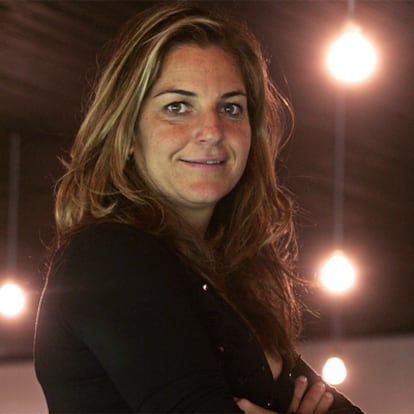“Today people don’t know the name of the tennis number one”
Arantxa Sánchez Vicario on the past and present of the women's game
Arantxa Sánchez Vicario, a former world number one, three times champion at Roland Garros and a US Open winner in an era when she had to compete against Steffi Graf, Martina Navratilova, Monica Seles and Martina Hingis, is the most successful Spanish player ever to have graced the WTA Tour. Today, she is the director of the Barcelona Ladies Open, the most important WTA event in Spain, which was won for the second time in three years by Italy's Roberta Vinci on Saturday.
Question. What does it mean to direct the Barcelona tournament?
Answer. It makes me happy. It's a way to give back to tennis some of what it has given me and to help women's tennis. I started on the professional circuit thanks to a wild card that I was offered by a tournament in Barcelona that no longer exists. We started this tournament in 2003 and regained top-level competition in Spain. We reserve the wild cards for Spanish players, so those who can't enter through their ranking know they have a chance, and that is fundamental for them to keep the motivation to keep going on the circuit.
"To be number one, you had to win a Grand Slam or two, or you wouldn't get there"
Q. Was it difficult to say goodbye in 2002?
A. It's the most difficult thing. I was 30, very young, but I had injuries that were stopping me from giving my best. That's why I decided to retire. I wanted to do it while I was still at the top and I'm sure it was the right moment.
Q. How do you see women's tennis at the moment?
A. It's different to our era. There are no players with charisma and personality like there were then. In my day there were eight or 10 players who always maintained great rivalries and to be number one, you had to win a Grand Slam or two, or you wouldn't get there. Now everything is much more open. You can be number one without winning a major. There is a lot of power in today's game but no variety. People still remember the veteran players. If you ask people, names like the Williams sisters, Clijsters or Henin will spring to their mind. And they don't know the name of the number one.
Q. Is it more open because there is less quality or because the average level has risen?
A. There's no consistency as there was before. A number one used to be the clear favorite to win a tournament and the rest of us were fighting to beat her in any tournament. Today, a different player wins a tournament every week and there is no regularity, which is indispensable to make tennis more attractive.
Q. Who is the best player in history in your opinion?
A. Martina Navratilova has always been the benchmark. But if you look at the statistics, the player who spent most weeks as number one was Steffi Graf. Based on that, for me she is the best, and it fills me with pride to have played against them and beaten them in epic matches when they were at their peak.
Q. What shape is Spanish tennis in?
A. Exceptional. The boys have won everything. Nadal is a phenomenon, a number one on and off the court. I like his character, his fighting spirit. And the rest: David Ferrer, a gladiator who has run into Nadal and who would win many more tournaments if Rafa wasn't playing. Almagro, Verdasco, Robredo, Feliciano... it's very pleasing.
Q. And the women?
A. It's difficult. Everything they do is compared to what Conchita [Martínez] and I did. It's not easy for them. But they need all our support and through this tournament we try to give it to them.

Tu suscripción se está usando en otro dispositivo
¿Quieres añadir otro usuario a tu suscripción?
Si continúas leyendo en este dispositivo, no se podrá leer en el otro.
FlechaTu suscripción se está usando en otro dispositivo y solo puedes acceder a EL PAÍS desde un dispositivo a la vez.
Si quieres compartir tu cuenta, cambia tu suscripción a la modalidad Premium, así podrás añadir otro usuario. Cada uno accederá con su propia cuenta de email, lo que os permitirá personalizar vuestra experiencia en EL PAÍS.
¿Tienes una suscripción de empresa? Accede aquí para contratar más cuentas.
En el caso de no saber quién está usando tu cuenta, te recomendamos cambiar tu contraseña aquí.
Si decides continuar compartiendo tu cuenta, este mensaje se mostrará en tu dispositivo y en el de la otra persona que está usando tu cuenta de forma indefinida, afectando a tu experiencia de lectura. Puedes consultar aquí los términos y condiciones de la suscripción digital.








































